
By: Edward Kim
This Earth Month, let’s celebrate some of the amazing environmental work Corps have accomplished. In the Pacific Northwest, specifically Eugene, OR, Northwest Youth Corps (NYC) is getting its hands green on an ongoing tree-planting project that’s reducing waste by recycling organic nutrients.
Trees are a vital component of the Earth’s ecosystems. Described as the lungs of our planet, trees and forests do much more than produce clean air for us to breathe. They also regulate the climate, provide homes for wildlife, prevent soil erosion, conserve water, and produce various products for human consumption and usage. That’s why it’s critical for conservation organizations and determined individuals to value and prioritize having healthy trees. Fortunately for us, that’s exactly what NYC has been doing for the last few years.
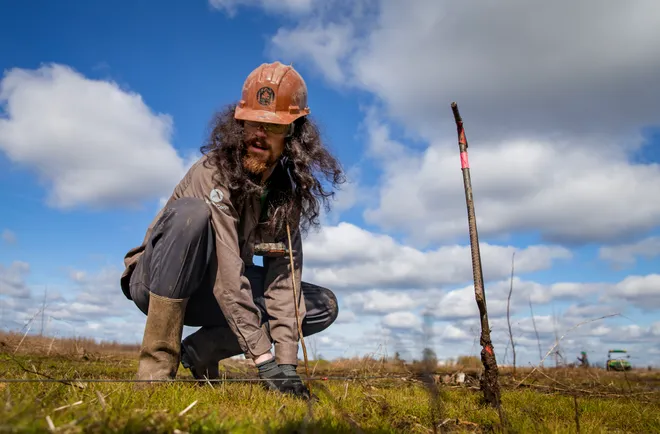
Kerrek Pegg, with Northwest Youth Corps, plants a poplar at the Metropolitan Wastewater Management Commission’s Biocycle Farm near Eugene March, 1, 2023. Photo from Ben Lonergan/The Register-Guard
NYC’s tree planting project is growing its roots in Metropolitan Wastewater Management Commission’s (MWMC) Biosolids Farm, a roughly 400-acre plantation that uses biosolids to fertilize trees. Biosolids are nutrient-rich organic materials derived from chemically and physically treated wastewater that comes from bathrooms, kitchens, laundry rooms, and more. Often used to improve soil health, similar to how animal manure is utilized agriculturally, biosolids can provide various benefits as they’re able to provide nutrients essential for plant growth. They can also improve soil structure and water-retaining properties.
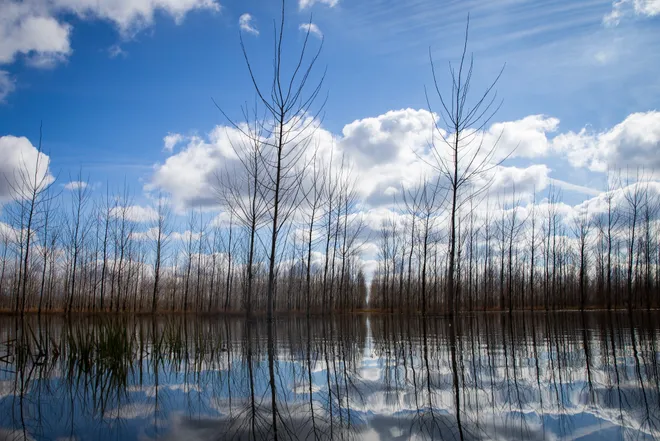
Poplar trees grow at the Metropolitan Wastewater Management Commission’s Biocycle Farm near Eugene March, 1, 2023. Photo from Ben Lonergan/The Register-Guard
“Biosolids are nutrient-rich organic materials derived from chemically and physically treated wastewater”
In 2018, NYC planted 28,000 hybrid poplar trees in one of the Biosolids Farm’s units and returned in 2019 and 2020 to conduct manual weed control and prune/single each tree. NYC then completed a demonstration of a Biochar experiment at the farm in 2022. More recently, between January 28 to March 31 of 2023, NYC planted 10,000+ poplar trees and harvested 15,000+ tree cuttings. Over 1,600 AmeriCorps member hours have been used so far this year.
between January 28 to March 31 of 2023, NYC planted 10,000+ poplar trees and harvested 15,000+ tree cuttings. Over 1,600 AmeriCorps member hours have been used so far this year
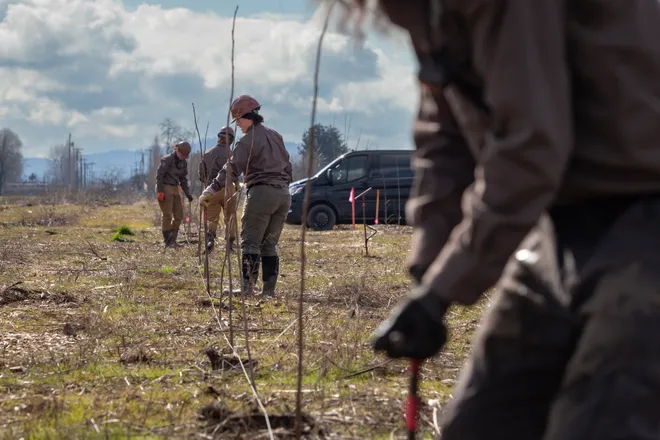
A Northwest Youth Corps crew plants poplar trees at the Metropolitan Wastewater Management Commission’s Biocycle Farm near Eugene March, 1, 2023. Photo from Ben Lonergan/The Register-Guard
Hybrid poplar trees were specifically chosen for this project. A rapidly growing tree that’s often used for reforestation and environmental remediation purposes, poplars can withstand a wide range of environmental conditions. Ally Richert, an NYC Program Coordinator overseeing this project with MWMC, describes these poplars as “fast-growing with a high assimilation capacity for water, nutrients, and soil contaminants.” This means that these trees can be irrigated with recycled water or amended with treatment plant biosolids, which use waste that’s typically sent to landfills.
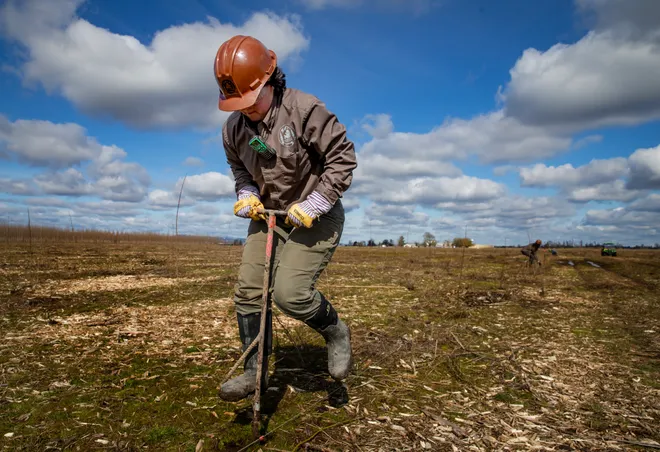
Autumn Gratton digs a hole for a poplar tree at the Metropolitan Wastewater Management Commission’s Biocycle Farm near Eugene March, 1, 2023. Photo from Ben Lonergan/The Register-Guard
This project produces commercial and economic benefits as well as environmental. According to MWMC, the poplars planted by NYC crews grow rapidly while consuming the nutrient-dense biosolids “making the Biocycle Farm a cost-effective method for recycling a byproduct of the wastewater treatment process.” There’s much to look forward to as “the trees are managed as an agricultural crop, with a growth period of up to 12 years, and then harvested and sold in the marketplace to offset operating costs for the farm as well as provide a renewable resource for our community.” The poplar trees planted by NYC will eventually be used for commercial use.
“a cost-effective method for recycling a byproduct of the wastewater treatment process”
As the poplar trees grow in soil supplemented with biosolids, so do the Corpsmembers’ knowledge and experience in impactful conservation careers. None of the participating Corpsmembers had previous poplar planting experiences, but they learned the ins and outs of the planting process, including harvesting, brush cutting, surveying, and then planting the tree itself. They also have the opportunity to tour the Biosolids plant while gaining useful knowledge on wastewater management and the biocycle process. NYC crews displayed noticeable improvement from when they first began the project as well.
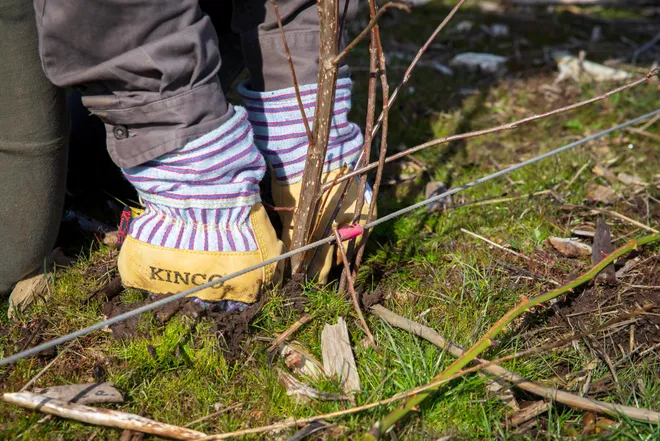
A worker with Northwest Youth Corps plants a poplar tree at the Metropolitan Wastewater Management Commission’s Biocycle Farm near Eugene March, 1, 2023. Photo from Ben Lonergan/The Register-Guard
“The Crew Members have really sped up the planting and harvesting process since their first week. They started with being able to plant SIX rows of trees a day to 27!” said Richert. “They have also been a steward to the wildlife in the area, helping preserve the wetland habitat that the trees grow in. In particular, they have been preserving the habitat and nests of killdeer, a native plover that makes nests on the ground.”
According to The Register-Guard, other wildlife, including “voles, deer, coyotes, eagles, hawks, and more”, have also been able to find a home in the farm’s units.
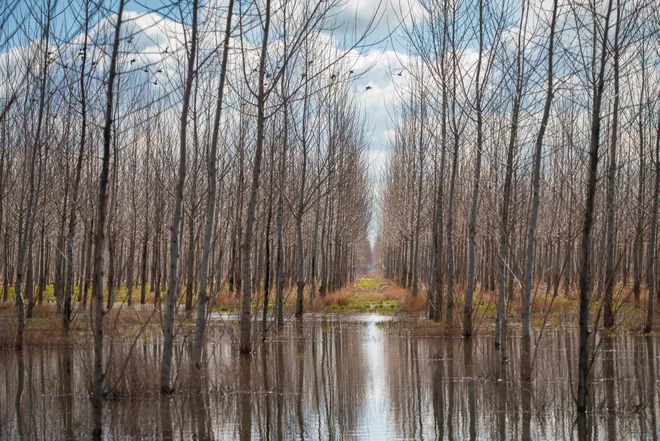
Poplar trees grow at the Metropolitan Wastewater Management Commission’s Biocycle Farm near Eugene. Photo from Ben Lonergan/The Register-Guard
As NYC continues to collaborate with MWMC, other Corps and conservation organizations can learn much from this resourceful tree-planting project that helps curb climate change while also producing commercial and environmental benefits to surrounding communities.
“There was no manual for this project, and the crew is now a wonderful blueprint for poplar planting at this farm in the future.” said Richert.
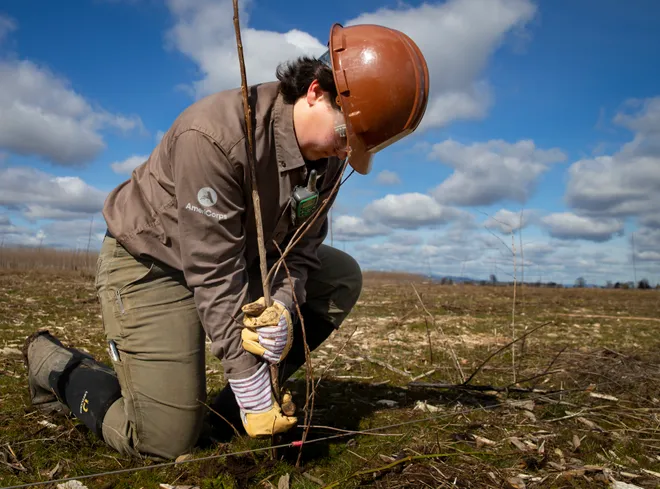
Autumn Gratton, with Northwest Youth Corps, plants a poplar at the Metropolitan Wastewater Management Commission’s Biocycle Farm near Eugene March, 1, 2023. Photo from Ben Lonergan/The Register-Guard


































































